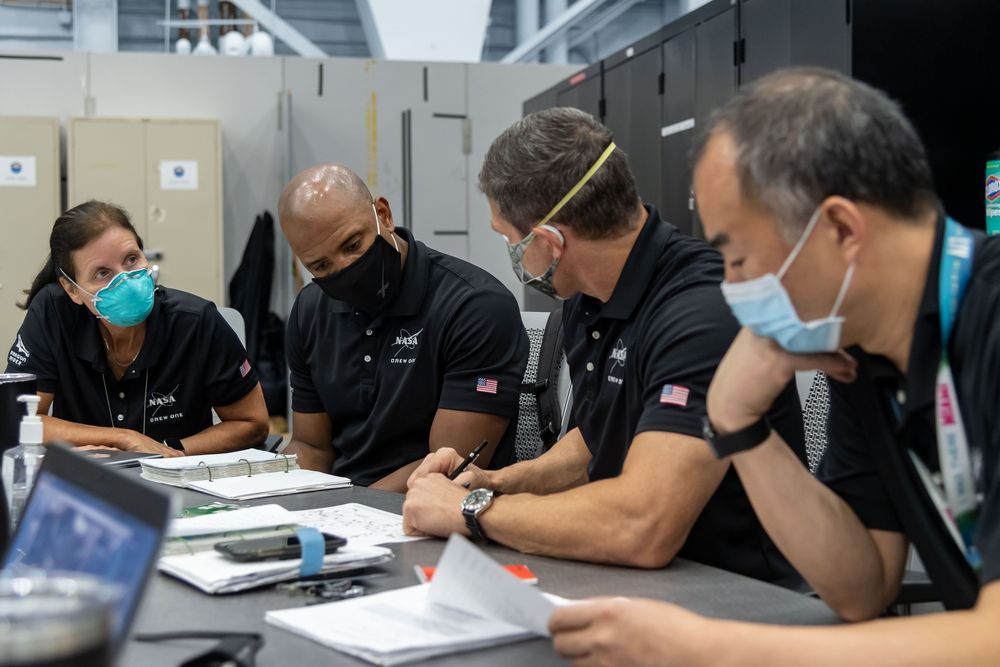Maria
Anior Wajdi
You missed a video chat with Anior. · 47m.
Marwane Khalloufi
You missed a video chat with Marwane. · 1h.
Rami Ramos
You missed a video chat with Rami. · 7h.

Maria
Anior Wajdi
You missed a video chat with Anior. · 47m.
Marwane Khalloufi
You missed a video chat with Marwane. · 1h.
Rami Ramos
You missed a video chat with Rami. · 7h.


Media accreditation now is open for NASA’s SpaceX Crew-1 mission to the International Space Station – the first operational flight of the SpaceX Crew Dragon spacecraft on a Falcon 9 rocket after certification by NASA for regular flights to the space station.
The launch is targeted for no earlier than late-September, following a successful return from the space station and evaluation of NASA’s SpaceX Demo-2 test flight with NASA astronauts Robert Behnken and Douglas Hurley.
Crew Dragon commander Michael Hopkins, pilot Victor Glover, and mission specialist Shannon Walker – all of NASA – along with Japan Aerospace Exploration Agency (JAXA) mission specialist Soichi Noguchi will launch on the Crew-1 mission from Launch Complex 39A at NASA’s Kennedy Space Center in Florida.



Goodbye depression.
Neuralink‘s mission has never quite been clear. We know it’s working on a chip designed to be surgically inserted into the human skull called a brain-computer interface (BCI), but exactly what and who it’s for remains a bit of a mystery.
As best we can tell based on what’s been revealed so far, it’s shaping up to be a terrifying hormone hijacker capable of potentially giving you forced mental orgasms or making you fall in love.
Yes.
Venus could serve as a model for many exoplanets soon to be discovered in the upcoming era of new space telescopes, such as James Webb and others.
So how did our sister planet evolve from a past “habitable” state to its present one, and how does that help us understand our own destiny?
Watch for more.
Tai Ding
A revolutionary innovation in corneal replacement therapy.

TOKYO – Although scientists know many of the underlying symptoms which trigger Alzheimer’s disease, a cure remains elusive. Now, a new study suggests that oxytocin, a hormone best known for promoting feelings of love and wellbeing, may reverse some of the damage the degenerative illness causes.
Alzheimer’s disease is a progressive brain disease causing the continuous deterioration of mental functions. Its primary symptoms include severely impaired thinking, memory loss, and confusion.
One of the primary culprits in Alzheimer’s is a protein known as amyloid β (Aβ). Researchers say Aβ clumps together to form plaques around neurons in the brain. These plaque build-ups disrupt normal neuron function and triggers the degeneration.

A Russian Soyuz rocket will launch a robotic cargo ship packed with tons of supplies to the International Space Station Thursday (July 29), and you can watch the launch live.
Roscosmos, Russia’s space agency, will launch the uncrewed Progress 76 supply ship to the station at 10:26 a.m. EDT (1426 GMT) from Baikonur Cosmodrome in Kazakhstan, where the local time will be 7:26 p.m. You can watch the launch live here and on the Space.com homepage, courtesy of NASA TV.